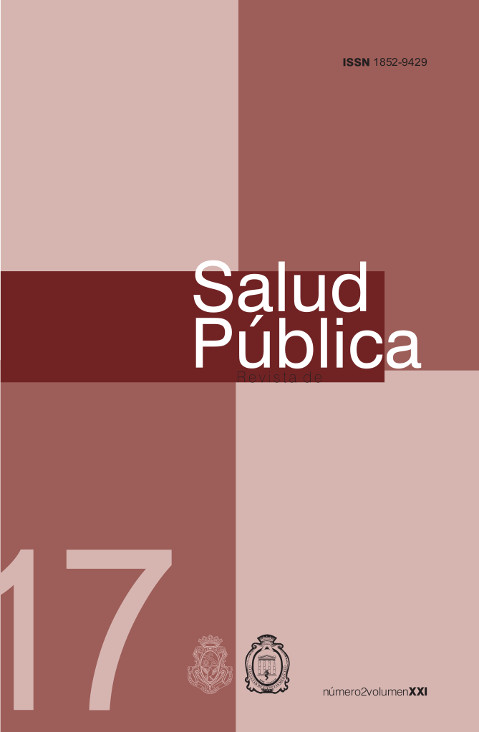TREATMENT WITH INTRAVENOUS IMMUNOGLOBULIN G (IgGiv).IMMUNOMODULATION REPRODUCTIVE FAILURES
DOI:
https://doi.org/10.31052/1853.1180.v21.n2.17144Keywords:
reproductive failure, intravenous immunoglobulin G, off-label use, pharmacovigilance.Abstract
Abstract: Approved uses of intravenous IgG suspensions (IgGiv) are agammaglobulinemias, immune thrombocytopenia, rheumatoid arthritis, Guillán-Barré syndrome, myasthenia gravis, multiple sclerosis. IgGiv is proposed as an immunomodulatory agent in reproductive failures since it has been used to evaluate rates of newborns in women with repeated failures in implantation (RFI) and recurrent abortions (RAb). However, this indication is not specified in the package leaflet (“off-label use”). Between 2010 and 2015, anamnesis and complete reproductive history were performed on 2333 couples, evaluating several factors. Of 447 pregnancies, 143 patients received IgGiv UNC treatment. 79 consulted for RAb (55%) and 64 for RFI (45%). The diagnosis of Hashimoto’s thyroiditis was positive in 91 patients (64%). In 3 patients (2%) there were adverse reactions. Live newborns were 83, success rate 58%. This high rate and the absence of adverse reactions are evidences of effectiveness and safety of IgGiv
Downloads
References
1. Grupo Español de Medicamentos Hemoderivados (GEMEH), Sociedad Española de Farmacia Hospitalaria (SEFH) editores. Guía Clínica para el uso de Inmunoglobulinas. Actualización de la 2da edición. 2011. Barcelona, España.
2. Carp HJA, Sapir T, Shoenfeld Y. Intravenous immunoglobulin and recurrent preg-nancy loss. Clin Rev Allergy Immunol2005;29:327-332
3. Howard JA, Carp MB. Intravenous immunoglobulin: effect on infertility and recur-rent pregnancy loss. IMAJ 2007;9:877-880
4. Christiansen OB, Nielsen HS, Kolte AM. Future directions of failed implantation and recurrent miscarriage research.Reprod Biomed Online 2006;13:71–83.
5. Tierney JP, Welsh J, Owen P, Effective Gynaecology in Glasgow Group. Man-agement of early pregnancy loss—a complete audit cycle. J ObstetGynaecol 2006;26:229–32.
6. Jauniaux E, Farquharson RG, Christiansen OB, Exalto N. Evidence-based guide-lines for the investigation and medical treatment of recurrent miscarriage. Hum Reprod 2006;21:2216–22.
7. Christiansen OB. Reproductive immunology. MolImmunol 2013;55:8–15.
8. Ledee N, Munaut C, Aubert J, Serazin V, Rahmati M, Chaouat G, et al. Specific and extensive endometrial deregulation is present before conception in IVF/ICSI repeated implantation failures or recurrent miscarriages. J Pathol 2011;225:554–64.
9. Coulam CB, Kaider BD, Kaider AS, Janowicz P, RoussevRG. Antiphospholipid antibodies associated with implantation failure after IVF/ET. J Assist Reprod Genet 1997;14:603–8.
10. Stern C, Chamley L, Hale L, Kloss M, Speirs A, Baker HW. Antibodies to beta2 glycoprotein I are associated with in vitro fertilization implantation failure as well as recurrent miscarriage: results of a prevalence study. FertilSteril 1998;70:938–44.
11. Chilcott IT, Margara R, Cohen H, Rai R, Skull J, Pickering W, et al. Pregnancy outcome is not affected by antiphospholipid antibody status in women referred for in vitro fertilization. FertilSteril 2000;73:526–30.
12. OutHJ, Kooijman CD, BruinseHW, Derksen RH. Histo-pathological findings from patients with intrauterine fetal death and antiphospholipid antibodies.EurJ.Obstet.Gynecol 1991; 41:179-186
13. Fettke F, Schmacher A, Costa SD, Zenclussen AC. B cells: the old new players In reproductive immunology. Front.Immunol.2014;5: 285
14. Lazarus JH. Thyroid disorders associated with pregnancy: etiology, diagnosis and management. Treat Endocrinol 2005;4(1):31-41
15. Barnhart K, Van Mello NM, Bourne T, Kirk E, Van Calster B, Bottomly C, et al.Pregnancy of unknown location: a consensus statement of nomenclature, defini-tions, and outcome. FertilSteril 2011;95:857–66.
16. Larsen EC, Christiansen OB, Kolte AM, Macklon N.New insights into mechanisms behind miscarriage. BMC Med 2013;11:154.
17. Kolte AM, van Oppenraaij RH, Quenby S, Farquharson RG, Stephenson M, God-dijn M, et al. Non-visualized pregnancy losses are prognostically important for un-explained recurrent miscarriage. Hum Reprod 2014;29:931–7.
18. Administración Nacional de Medicamentos Alimentos y Tecnología Médica (ANMAT). Disposición N°5358/12. Guía de Buenas Prácticas de Farmacovigilancia. [Acceso: junio 2016]. Disponible en: http://www.anmat.gov.ar/boletin_anmat/septiembre_2012/Dispo_5358-12.pdf.
19. Organización Mundial de la Salud (OMS). Perspectivas políticas sobre medicamentos de la OMS. Promoción del uso racional de medicamentos: componentes centrales. Ginebra, 2002. [Acceso: junio 2016]. Disponible en: http://apps.who.int/medicinedocs/pdf/s4874s/s4874s.pdf.
20. Di RienzoJ.A., Casanoves F., BalzariniM.G., Gonzalez L., Tablada M., Robledo C.W. InfoStat versión 2013. Grupo InfoStat, FCA, Universidad Nacional de Córdoba, Argentina. URL
21. Nyborg KM, Kolte AM, LarsenEC, Christiansen OB. Ommunomodulatory treat-Ommunomodulatory treat-mentwith intravenous immunoglobulin and prednisone in patients with recurrent miscarriage and implantation failure after in vitro fertilization/intracytoplasmic sperm injection. FertlSteril2014: in press.
22. Sher G, Maassarani G, Zouves C, Feinman M, Sohn S, Matzner W, et al. The use of combined heparin/aspirin and immunoglobulin G therapy in the treatment of in vitro fertilization patients with antithyroid antibodies. Am J ReprodImmunol 1998;39:223–5.
23. Virro MR, Winger EE, Reed JL. Intravenous immunoglobulin for repeated IVFfail-ure and unexplained infertility. Am J ReprodImmunol 2012;68:218–25.
24. Heilmann L, Schorsch M, Hahn T. CD3CD56þCD16þ Natural killer cells and im-provement of pregnancy outcome in IVF/ICSI failure after additional IVIG-treat-ment. Am J ReprodImmunol 2010;63:263–5.
25. Winger EE, Reed JL, Ashoush S, El-Toukhy T, Ahuja S, Taranissi M. Elevated pre-conception CD56þ16þ and/or Th1/Th2 levels predict benefit from IVIGtherapyin-subfertile women undergoing IVF. Am J ReprodImmunol 2011;66:394–403.
26. Heuvel Van den, Peralta CG, Hatta K, Han VK, Clark DA. Decline in number of elevated blood CD3 þ CD56 þ NKT cells in response to intravenous immu-noglobulin treatment correlates with successful pregnancy.Am J ReprodImmunol 2007;58:447–59.
Downloads
Published
Issue
Section
License
Copyright (c) 2017 Escuela de Salud Pública y Ambiente. Facultad de Ciencias Médicas. Universidad Nacional de Córdoba

This work is licensed under a Creative Commons Attribution-NonCommercial 4.0 International License.
Authors who publish with this journal agree to the following terms:
- Authors retain copyright and grant the journal right of first publication with the work simultaneously licensed under a Creative Commons Attribution License which allows the work to be copied, distributed, exhibited and interpreted as long as it is not done for commercial purposes.
- Authors are able to enter into separate, additional contractual arrangements for the non-exclusive distribution of the journal's published version of the work (e.g., post it to an institutional repository or publish it in a book), with an acknowledgement of its initial publication in this journal.
- Authors are permitted and encouraged to post their work online (e.g., in institutional repositories or on their website) after the publication process. (See The Effect of Open Access). (See The Effect of Open Access).







